How to Get An A* in A Level Chemistry
Key Takeaways
To get an A* in A-Level chemistry, you should:
- Use a study system that emphasises learning, understanding, and regular review of the material.
- Use SMART goals for efficient revision planning.
- Use active recall techniques and review material at increasing intervals for better retention.
- Make and regularly update your own notes for a deeper understanding of the topics.
- Use flashcards for memorisation and mind maps for understanding complex connections in chemistry.
- Use topical exam questions and past papers to assess and improve your understanding and exam technique.
- Develop strong problem-solving skills and proficiency in chemistry calculations.
- Pay special attention to practical chemistry.
- Go beyond the syllabus to enhance your understanding and chances of achieving an A*.
Contents
- Unlocking Excellence in A-Level Chemistry: Your Roadmap to the Top Grade
- How Hard Is It to Get An A* In A Level Chemistry?
- Have An Effective A* Study System
- Make Your Revision Plan Goal-Focused
- Use Active Recall and Spaced Repetition
- Make Notes and Keep Them Updated
- Elevate Your A-Level Chemistry Revision with Flashcards and Mind Maps
- Assessing Your Understanding Using Exam Questions
- Improving Exam Technique Using Past Papers
- Identifying Weaknesses and Improving On Them
- Consolidating And Reviewing
- Examiner Reports: A Treasure Trove of Exam Insights
- Improve Problem-Solving Skills with Hard Questions
- Work On Mastering Chemistry Calculations
- Practise Important Skills to Achieve Fluency
- Don’t Overlook the Importance of Practical Chemistry
- Know How to Answer 6-Mark Questions Effectively
- Extend Your Knowledge
- Final Words
Unlocking Excellence in A-Level Chemistry: Your Roadmap to the Top Grade
Welcome to my comprehensive guide on mastering A-Level chemistry!
A-Level chemistry is a very challenging A-Level, but you can master it with the right approach. This guide contains practical advice and revision tips to improve your understanding and performance. It tells you what you should do to get an A*, and how to do it.
I have advice if you’re worried about practical chemistry questions or multistep calculations. You’ll also find sections on problem-solving skills, tackling A* questions, and much more.
This guide is based on over 12 years’ work helping students to achieve top grades. It will transform your studies and help you unlock that much-coveted A* grade.
So, why wait? Dive in and start your journey towards A-Level chemistry success today!
This is a long guide, so don’t try to absorb it all in one go. Please bookmark it so you can come back to it later.
How Hard Is It to Get An A* In A Level Chemistry?
Getting into the exclusive chemistry A* club is difficult. On average, only around 1 in 10 students achieve the top grade each summer.
You don’t need to be a chemistry genius to achieve an A* either. How you prepare for the exams is just as important as your innate ability. Effective study strategies can maximise your potential and improve your performance.
This table shows the percentages needed for grades A*-B for AQA, CAIE, Edexcel, OCR, and WJEC.
| Exam board | A* | A | B |
| AQA | 81 | 67 | 55 |
| CAIE | 73 | 64 | 55 |
| Edexcel | 80 | 65 | 53 |
| OCR | 75 | 63 | 51 |
| WJEC | 72 | 61 | 52 |
| Average | 76 | 64 | 53 |
The boundaries vary slightly between exam boards, but on average, you need 76% for an A*, 64% for an A, and 53% for a B.
(Figures based on 2017 – 2023 data. Includes the 2020 autumn exams and 2021 summer exams used in the Covid-19 pandemic).
Have An Effective A* Study System
As an experienced chemistry tutor, I’ve seen countless students navigate the challenging waters of A-Level chemistry. One thing that consistently stands out among top-performing students is their approach. The importance of the right approach to studying for an A* can’t be stated enough. This means your study system. To be effective, your study system should help with:
- Learning and memorising information
- Assessing your understanding
- Identifying weaknesses and improving them
- Regular consolidation and review, so that concepts stay fresh, and skills stay fluent
Identifying weaknesses and improving them is critical. The difference between an A and an A* can be just a few marks. The ‘Plan, Do, Review, Master’ system is great for ensuring your exam preparation is efficient and focused on improvements:
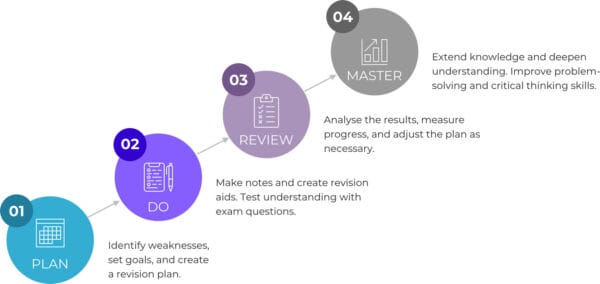
The 4 key steps in this system are:
- Plan: Identify weaknesses, set goals, and create a revision plan.
- Do: Make notes and create revision aids. Test understanding with exam questions.
- Review: Analyse the results, measure progress, and adjust the plan as needed.
- Master: Extend knowledge and deepen understanding. Improve problem-solving and critical thinking skills.
Next, we’ll create a goal-focused A-Level chemistry revision plan that helps you target improvements.
Make Your Revision Plan Goal-Focused
For an effective revision plan, it’s better to have focused and actionable goals instead of broadly allocating large chunks of time to subjects. Use SMART (Specific, Measurable, Achievable, Relevant, Time-bound) goals for a clearer, structured approach:
Specific: Clearly define your goal.
E.g., Instead of “I want to get better at organic chemistry,” specify, “I aim to excel in organic synthesis involving aromatic chemistry.”
Measurable: Ensure you can track your progress.
E.g., “I aim to score at least 90% consistently on organic synthesis exam questions.”
Achievable: Set realistic objectives.
E.g., It’s unrealistic to master organic synthesis in a few days; you must understand reactions, reagents, and conditions first.
Relevant: Align goals with your main study objectives.
E.g., If you’re already proficient in organic synthesis, it might not be a priority.
Time-bound: Set a deadline for your goal.
E.g., “I intend to grasp organic synthesis two weeks before the exams for retention.”(organic synthesis has a lot of information to remember so you want to peak at the right time).
By incorporating SMART goals, you ensure clarity, motivation, and a direct route to success in your revision.
Identifying your revision SMART goals
How do you know what your SMART goals should be? They should target weaknesses first, and general revision objectives second. Most students know their weak topics but to do it more systematically, highlight each topic in your syllabus as red, yellow and green depending on your level of understanding and confidence.
Red = not well understood / not confident / can’t answer questions
Yellow = reasonable understanding / not completely confident / can do some questions
Green = completely understand / confident / have no problem with questions
Make evaluations evidence based. For instance, if you grasp a theory but get questions wrong, it’s not a ‘green’ topic.
Incorporating SMART Goals Into Your Revision Plan
Once you’ve designed SMART goals, here’s how to incorporate them into your revision plan:
- Schedule: Set specific times daily or weekly for your goals.
- Break Down Goals: Segment bigger goals into actionable daily or weekly tasks.
- Track Progress: Compare achievements with set targets.
- Adjustment: Be flexible; modify goals if needed.
- Accountability: Share goals for external motivation.
- Rewards: Recognize and celebrate milestones.
Incorporating SMART goals into your study plan provides structure and direction. This helps you stay focused and motivated on your path to academic success.
How much time should you spend revising? There is no set answer for this. A-Level chemistry is supposed to be taught over 360 hours, but there isn’t a recommended timespan for revision.
Most students start serious revision once teaching has finished, which is usually around Easter of the exam year. How much time you need to revise then depends on several factors, such as how well you understand the topics, and how fresh the content is. It’s highly personal in other words.
You should space out your revision and avoid cramming, as discussed in the next section.
Use Active Recall and Spaced Repetition
Active recall and spaced repetition should be at the heart of your study system. These two study methods are proven to be highly effective for learning and retaining information.
- Active recall involves forcing yourself to recall information from memory, instead of re-reading. It involves techniques like self-quizzing, flashcards, or explaining the material to someone else. Research shows that active recall improves information retention. It strengthens neural connections and forces the brain to engage more deeply with the material.
- Spaced repetition involves reviewing material at increasing time intervals. Rather than cram, you study a piece of information, then review it after a day, then two days, then four days, and so on. This method draws on research that shows we learn more effectively when learning is spaced out over time.
Both techniques are important if you’re aiming for a top grade. Primarily, they improve memory retention, which is vital for remembering the material needed for the exam. But they also promote deeper understanding and engagement with the material, which can be key for the higher-level thinking and problem-solving skills needed for the most demanding ‘A*’ questions.
They’re also time efficient. Rather than repeatedly reading material, use these methods to recall or periodically review it, leaving time for other tasks like problem-solving.
As for how long you should revise each day, I advise up to 5 hours per day when you’re not in school, with a day off each week. Longer than this tends to be counterproductive. Again though, this is highly personal. Research and conventional wisdom may well say that all-day revision sessions in the last two weeks before the exam aren’t effective, but it works for some students. If you’re one of them, explore some of the strategies in this guide, but don’t feel pressured to change.
Make Notes and Keep Them Updated
A good set of notes is the foundation for your study system. Taking notes in your own words is important for several reasons:
- It deepens understanding through active engagement with the material.
- It enhances retention, as the act of writing encodes information in memory.
- Personalised notes cater to your learning style, emphasising concepts you find challenging while incorporating your insights.
- It fosters creativity in organising and presenting information.
- It’s a useful skill for your later university studies
However, don’t just read over your notes and think you’ve understood a topic because it all ‘makes sense’. A Level chemistry emphasises application of knowledge rather than recall of knowledge and you can’t assess your ability to do this passively reading. Active practice is essential, as exams test knowledge application, often through multi-step procedures (e.g. calculations and mechanisms). You should test your ability to do this by working through exam questions on every topic.
Try to get into the habit of writing up your class notes as you’re covering each topic, and supplement them with
If you drop marks because you missed out key points, or you hadn’t understood something as well as you thought, then make sure you update your notes to include what you missed. If you don’t do this, you will repeat the same mistake.
Elevate Your A-Level Chemistry Revision with Flashcards and Mind Maps
Boost Your Revision with Chemistry Flashcards
Flashcards are not just for vocabulary; they’re a powerhouse for chemistry revision. Here are some ideas for how you can use them effectively:
- Definitions: Write the keyword on one side and its definition on the other.
- Organic Functional Groups: On one side, sketch the structure, and on the other, jot down the name of the functional group.
- Organic Reactions: On one side, show the reactants and products. On the other side, list down the reagents and conditions.
- Equations: Write the equation on one side, and then define the equation terms on the other, together with their units.
- Calculations: On one side, write the calculation objective, on the other side, write down the required equation and the steps involved.
- Apparatus: Have a labelled diagram on one side, and on the other, its name and use.
Space repetition apps like Anki, Memrise, and Quizlet are also worth checking out.
Mind Maps: Your Chemistry GPS System
Mind maps are ideal for subjects that have interconnected concepts, like chemistry.
- Organic Synthesis Pathways: Start with a central functional group, say alcohols. Branch out to show how alcohols can be converted to aldehydes, ketones, carboxylic acids, and esters. This visual representation can help you see the bigger picture of organic transformations.
- Transition Metal Aqueous Chemistry: Begin with a specific complex ion in the centre. From there, branch out to show its reactions with various reagents. This approach will help you understand the behaviour of complex ions in different scenarios.
- Concept Mapping: creating mind maps from memory for a topic is also a great way of revising it (this is a good example of active recall).
Assessing Your Understanding Using Exam Questions
Past paper questions play an important role in effective exam preparation and offer numerous benefits that textbooks and classroom teaching cannot provide. Booklets of questions by topic are available from several websites, and past papers are available from exam boards.
I recommend using topical questions to thoroughly test your knowledge and help master a topic, before moving on to complete past papers and finally, past papers under exam conditions.
| Feature of past papers | How it benefits |
| Knowledge Assessment | Past papers test the entire A-Level chemistry syllabus, requiring you to develop a solid understanding of fundamental concepts, which is essential for achieving an A*. |
| Deeper Concept Application | Past papers require you to apply your knowledge beyond classroom and textbook examples to solve problems in a real exam context. This develops problem-solving skills and prepares you for the questions you’ll face in the actual A-Level exams. |
| Question Variety | Past papers contain different types of questions, including multiple-choice, structured questions, and extended response. This variety challenges you to adapt to various question formats, enhancing your flexibility and readiness for the actual exams. |
| Synoptic Assessment | A-Level chemistry requires integrating knowledge from diverse topics, and past papers often have questions that prompt you to connect information from different parts of the syllabus. This promotes a holistic understanding of chemistry and a cohesive view of the subject |
| Time Management | Practicing past papers under timed conditions is a critical aspect of exam preparation. It helps you develop effective time management skills and gives you experience in completing an exam within the allocated time. This is vital for achieving top grades as it ensures you can provide quality answers to all questions. |
| Weakness Identification | Attempting past papers allows you to identify your strengths and weaknesses in different topics and skills. This self-assessment is essential for targeted study and improvement, focusing you on areas that require more attention. |
| Exposure to Exam Style and Format | Each examination board has a unique style and format. Past papers from your board familiarise you with the exact types of questions you’ll encounter in your A-Level exams, essential for success. |
| Confidence Building | Working through past papers and seeing progress builds your confidence in your abilities. This confidence is important for tackling the actual exams with calmness and resilience. |
Improving Exam Technique Using Past Papers
Exam technique encompasses:
- Time management: Use time effectively to address all questions without rushing. For instance, a 4-mark question should take 4 minutes, including reading and reviewing.
- Command words: Adhere to command words in questions. If asked to ‘State and explain’, merely ‘Stating’ will cost you marks.
- Mark schemes: Understand how marks are allocated and what is needed to score maximum marks.
- Precise answers: Give clear and concise responses that use technical terms correctly. Avoid redundancy or contradiction.
- Question strategies: 6-mark extended response questions, graph-plotting questions, and multiple-choice questions have a different approach.
- Avoid mistakes: Recognise and avoid common pitfalls in A-Level chemistry exams. Be wary of answers that may be penalised.
- Question priority: Tackle questions based on their value and complexity, leaving harder low-mark questions for later. A 1-mark multiple-choice question involving 3 calculations is best left until last.
You can use either topical exam question packs (from sites like Physics and Maths Tutor) or past papers to improve these skills, but I recommend doing most past papers under exam conditions to give you a realistic exam experience. Ideally, save the most recent past papers until the last few weeks before the exam. This will allow you to improve on any weaknesses and make final refinements.
Identifying Weaknesses and Improving On Them
As I keep reiterating, your study system needs to be very much focused on making improvements. The difference between an A and A* grade is marginal.
- Review Past Papers: After attempting past papers, assess mistakes and uncertainties. Analyse any questions you got wrong. Determine if errors stem from knowledge gaps, misinterpretation, or miscalculation to pinpoint improvement areas.
- Address Knowledge Gaps: Don’t just memorise; make sure you understand the core concepts. Revisit textbooks, notes, videos, or other resources for a well-rounded grasp of topics.
- Seek Feedback: Obtain insights from teachers at your school or college, tutors, online forums, or study groups. Their perspective can guide enhancement.
- Reassess: Once you’ve worked on mistakes, retake challenging past papers to gauge progress and ensure deep understanding.
- Diversify Exam Boards: Familiarize with various exam boards to be comfortable with different question styles and content. If you excel in one board’s questions but falter in another’s, re-evaluate your topic mastery.
- Embrace Mistakes: Mistakes are growth opportunities. Don’t get disheartened; use them to guide your improvement. Stay persistent for success.
Consolidating And Reviewing
Regular review is essential to long-term retention of knowledge in any subject. The Ebbinghaus forgetting curve below shows how quickly we forget information without regular review. Active recall and spaced repetition (discussed above) involve reviewing information at increasing intervals. Tools like Quizlet and Memrise are good ways to build spaced repetition into your study system.
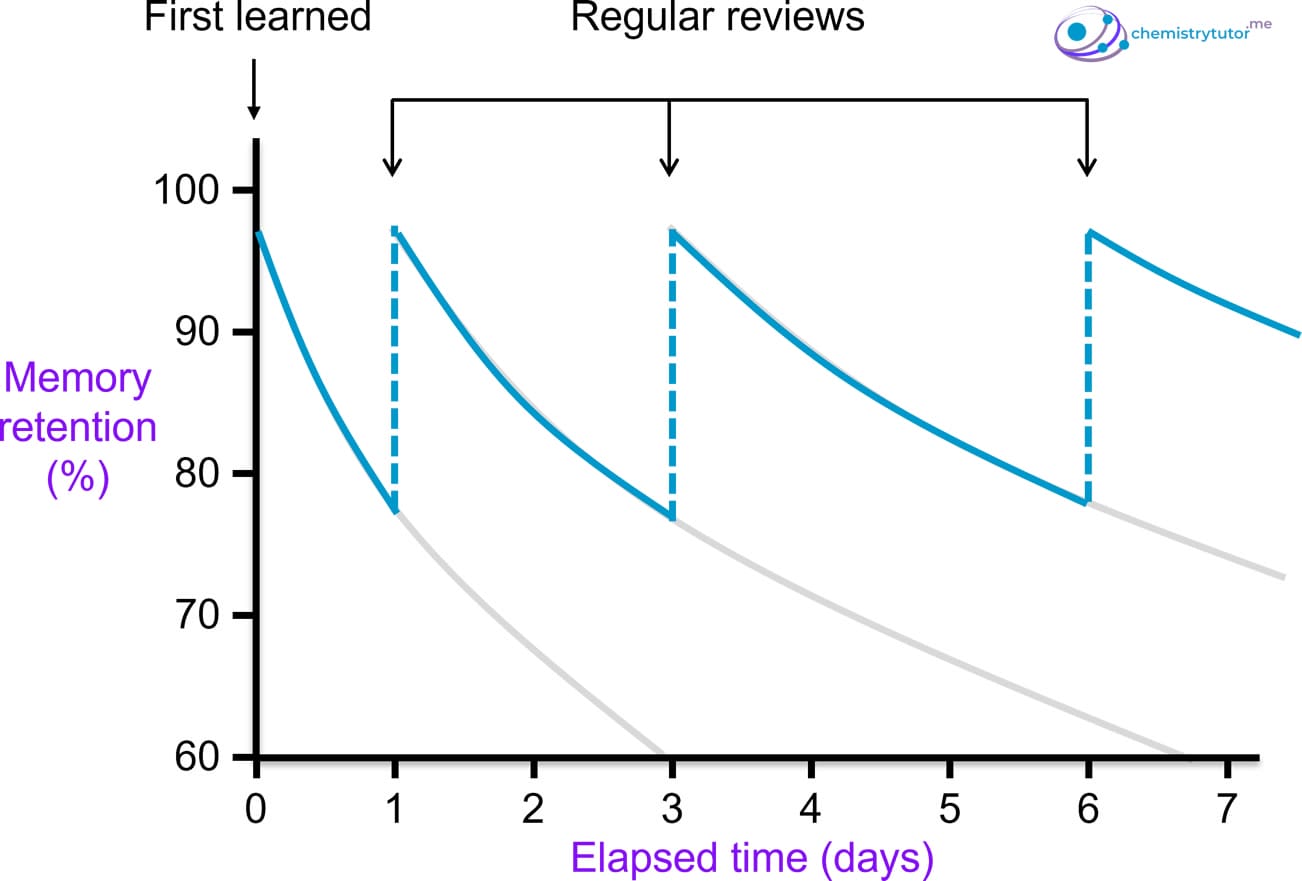
Engaging with practice problems and creating concise summary notes for each topic reinforce understanding. Teaching the topic to someone else and using visual tools like mind maps connect new knowledge with what you’ve learned before. Participating in group study sessions can also enhance consolidation and review.
Identify challenging topics and review them more frequently, using spaced repetition apps and websites when needed. Create a review schedule that includes daily, weekly, and monthly reviews, along with self-assessment quizzes to track progress. Celebrate successful recall to stay motivated.
Make sure you also regularly practise the essential skills I’ve described. Some of them (like balancing redox equations) involve a lot of individual steps which are easy to forget otherwise. If you don’t do a back titration question for months, you could easily forget how to do them.
Consistent consolidation and review ensures that your knowledge remains fresh and at your fingertips during exams.
Examiner Reports: A Treasure Trove of Exam Insights
Examiner reports are a secret weapon that many top students swear by. Here are some reasons why they are an invaluable part of your preparation:
- They help you avoid common mistakes. Examiner reports meticulously document patterns observed during marking. By reviewing these reports, you can pinpoint frequent errors and ensure you don’t replicate them, enhancing your chances of a higher score.
- They help you understand the examiner’s perspective. These reports offer a unique insight into the examiner’s expectations. By aligning your answers with their criteria, you can optimize your responses to secure those crucial marks.
- They help clarify ambiguous topics. Certain topics can be particularly challenging. Examiner reports often shed light on these areas, offering clarity and direction, ensuring you focus your revision efforts effectively.
- They can help refine your revision strategy. Instead of a broad revision approach, use the insights from the report to target specific areas of improvement. This strategic approach ensures you’re making the most of your study time.
- They can help your confidence. Finding out that you scored full marks on a past paper question that only 10% of that year’s cohort got right can give your confidence a huge boost. Arming yourself with insights directly from the examination board can also bolster your confidence. Knowing you’re preparing with a resource that directly addresses the exam’s intricacies can be reassuring.
Improve Problem-Solving Skills with Hard Questions
That question that still made no sense even after reading it for the third time? It was probably a discriminating question. Also called “stretch and challenge” questions, discriminating questions are designed to challenge the most able students. They are called discriminating questions because they distinguish between top grades. They often go beyond the basic syllabus material and ask you to apply your knowledge to novel and challenging situations. These questions are not only a test of knowledge but also a test of understanding, analytical abilities, problem-solving skills and critical thinking. They require precision, clarity, creativity and the ability to think on your feet.
You will find discriminating questions when doing past papers – they’re easy to spot because they seem different and usually cause a lot of head-scratching.
Let’s look at the typical characteristics of discriminating questions:
| Characteristics of discriminating questions | Explanation |
| Synoptic | Hard question often require you to make connections between various concepts or theories, demonstrating a deep, integrated understanding of chemistry. |
| Complexity | These questions are typically more complex, often involving multiple stages and steps to arrive at the final answer. They call for deeper understanding and the ability to apply knowledge in new, unfamiliar or complex contexts. This might involve designing experiments, making predictions, explaining phenomena, or analysing data. |
| Mathematical Skills | Complex multistep calculations, the use of formulas, unit conversions, or the interpretation of graphs and data may be involved, highlighting the importance of good mathematical skills. |
| Higher Order Thinking | Discriminating questions also demand higher-order thinking skills, such as analysis, synthesis, evaluation, and application. These questions often go beyond basic knowledge and rote memorisation of facts, requiring you to critically evaluate information, make judgments, and draw conclusions from the given data. Many discriminating questions involve the interpretation of data, graphs or experimental results, requiring accurate understanding and meaningful conclusions. |
| Creative and Original Thinking | Discriminating questions are often novel, challenging you to think creatively, propose novel solutions, or analyse unfamiliar situations, rather than simply regurgitate memorised information or a rehearsed solution (i.e. you know how to do it because you’ve seen it before on other past papers). |
| Extended response (and 6-mark level of response) | The need to construct an argument, explain a process, or describe a concept in detail is common in stretch and challenge questions. Your responses should be well-structured and communicate your understanding effectively. |
| Time Pressured | Time management is crucial when tackling these questions due to their complexity. Students must wisely allocate their time to fully answer these questions within the exam time limits. |
Which Topics Commonly Discriminate Between Top Grades?
Here is a table of the most common discriminating question topics:
| Topic | Common discriminating questions |
| Amount of substance | Unstructured, multistep calculations involving:
The ideal gas equation Limiting reactants Combustion analysis Waters of crystallisation Precipitation analysis Titrations and back-titrations |
| Atomic structure | Predicting the appearance of mass spectra
Calculating isotopic abundances Relating ionisation energies and electronic structure |
| Periodicity | Extended response questions on physical property trends |
| Bonding | Dot-and-cross diagrams of unfamiliar molecules and ions
Relating intermolecular forces and physical properties Using bond polarity and VSEPR to determine polarity Identifying coordinate bonds |
| Redox | Dealing with unfamiliar redox equations
Redox titrations Redox chemistry of fuel cells |
| Kinetics | Deducing rate equations from initial rate data
Proposing mechanisms Using the Arrhenius equation |
| Thermodynamics | Hess’s Law and calorimetry involving unfamiliar energy cycles
More difficult Kc and Kp calculations More complex Born-Haber calculations The effect of temperature on reaction feasibility (spontaneity) |
| Acid-base equilibria | The effect of temperature on Kw
pH of solutions after acid-base reactions (using limiting reactants) Buffer calculations |
| Transition metals | Extended response questions involving chemical tests to identify transition metal complex ions |
| Organic chemistry | Finding different isomers of a given formula
Naming more complex molecules (multiple functional groups, less common functional groups) Interpreting skeletal formula for more complex molecules Drawing more complex molecules (such as DNA bases) Drawing stereoisomers of more complex molecules Deducing mechanisms for unfamiliar reactions Developing longer multi-step routes to organic compounds Identifying unexpected products (such as cyclic condensation polymers) |
| Organic analysis | Using mass spectrometry, infrared and NMR to deduce structures
NMR of symmetrical and cyclic molecules NMR to distinguish between isomers NMR of more complex molecules Deducing molecular formula from molar mass |
Organic chemistry (love it or hate it!) is clearly a topic you need to master if you’re going for an A*.
The large number of calculations makes acids and bases inherently difficult. Until you have mastered this topic, you can make mistakes by misunderstanding the chemistry and selecting the wrong calculation approach. A common mistake is not realising you are dealing with a buffer solution and treating it as a weak acid.
How To Find Discriminating Questions
Finding stretch and challenge questions is one of the main reasons you should read examiner reports if you’re aiming for an A*. If the examiner report describes a question that only 10% of students achieved full marks on, you want to find it and have a go because those students will be the 10% that got A*s.
This is what the examiner report said about the back titration question featured in the next section:

This is a good example of an “A*” question and how they’re described in examiner reports.
To help you find discriminating questions, paste this expression (without the quotes) into the search box of your .pdf software:
“major most able best hard rare elusiv evad fail mistak unfamiliar difficult demand trick challeng problem differentiat discrimin stretch”
If you use Adobe, you need to enable ‘Stemming’ and ‘Match any of the words’.
This will help you find sentence like, “Only the most able students scored full marks here…”, “This question discriminated well…”, “This unfamiliar redox equation proved challenging…”, which signpost a stretch and challenge question.
You can also find discriminating questions on Twitter (sorry, ‘X’). There are often post-exam tweets calling for petitions about them because students felt they went “off spec”.
Work On Mastering Chemistry Calculations
“Successful candidates…could carry out unstructured calculations” (Edexcel Examiner report, June 2022)
Tips For Solving Complex, Multistep Calculations
The hardest calculations are usually novel. They require you to use your problem-solving skills to come up with original solutions. This means you should always try to understand the chemical principles behind calculations, instead of trying to learn how to do them by rote.
The key to solving calculation problems is often seeing the connection between the information given and the information missing. With questions based on experiments, it’s often useful to sketch a quick diagram to show the steps (this is known as visualisation). That can help understand the connection between the data and the experimental steps more clearly.
Here are some recommendations for tackling difficult calculations:
- Read the whole question carefully first. Don’t start calculating until you know what you’re going to do with the numbers.
- Underline important information. This means the key data, whatever you’re trying to find, and any instructions regarding units or significant figures.
- Draw diagrams to show the steps. This helps to bring the problem to life and see how the data are connected. Visualising the experiment through diagrams helps to correctly analyse the data, as you will see more clearly how each number relates to an experimental step.
- Write relevant mathematical equations. Always write the relevant mathematical equation needed to solve the problem. You can then compare the information given in the question with the terms in the equation. This shows you what needs to be calculated.
- Write relevant chemical equations. Difficult questions often describe reactions in words and omit the equation. The equation is usually needed to see the reacting ratios though, so write one.
- Relate the unknown and known. This means try to see the connection between what you know and what you’re trying to find. This will show you the path to follow to reach the answer.
To illustrate this approach, look at this this difficult 7-mark back titration question from AQA (2028, Paper 1, Q10.1)
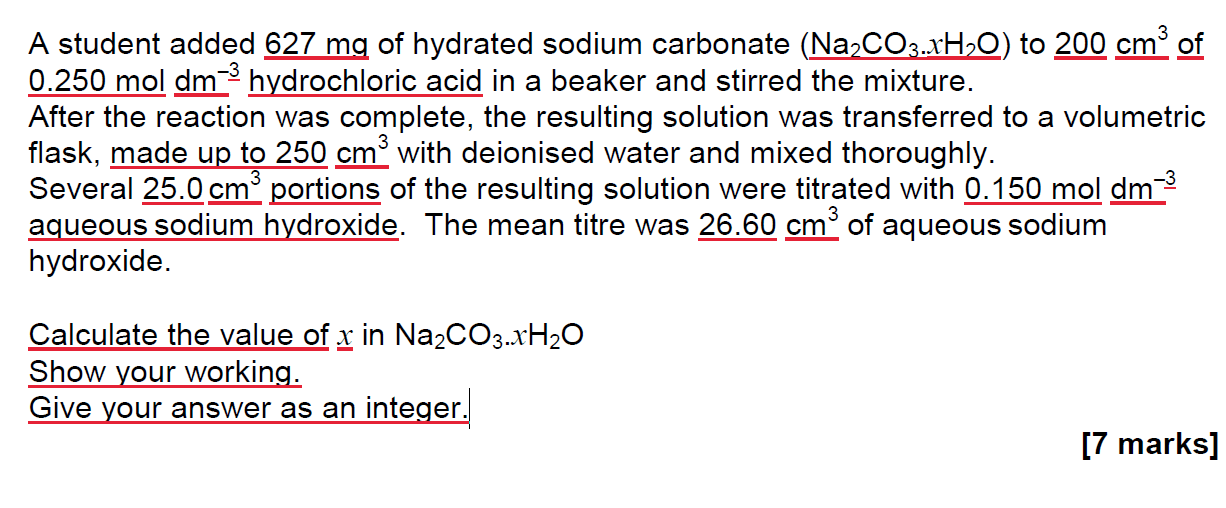
- All the essential information has been underlined, including the instruction about the answer format. Missing this would lose a mark.
- A simple flow diagram shows how the data fit with the procedure.
- The chemical equations (not give in the question) have been written. These show the reacting ratios needed in the calculation.
- The critical step in solving this is realising that the molar mass of the hydrate is needed to find x. Deducting the mass of Na2CO3 from the molar mass leaves a mass that must be due to water, and dividing this by 18 finds x.
- The key equation is therefore the one relating Mr, mass, and moles. Writing this, we can see that the mass is provided (627 mg), so the objective becomes to find the moles.
- In a back titration, the moles of analyte is calculated from the moles of the standard that reacted with it, using the ratio in the chemical equation.
- Moles of the standard that reacted is itself calculated by subtracting the amount remaining (found by titration) from the total amount used (“excess – leftover” as shown in the diagram)
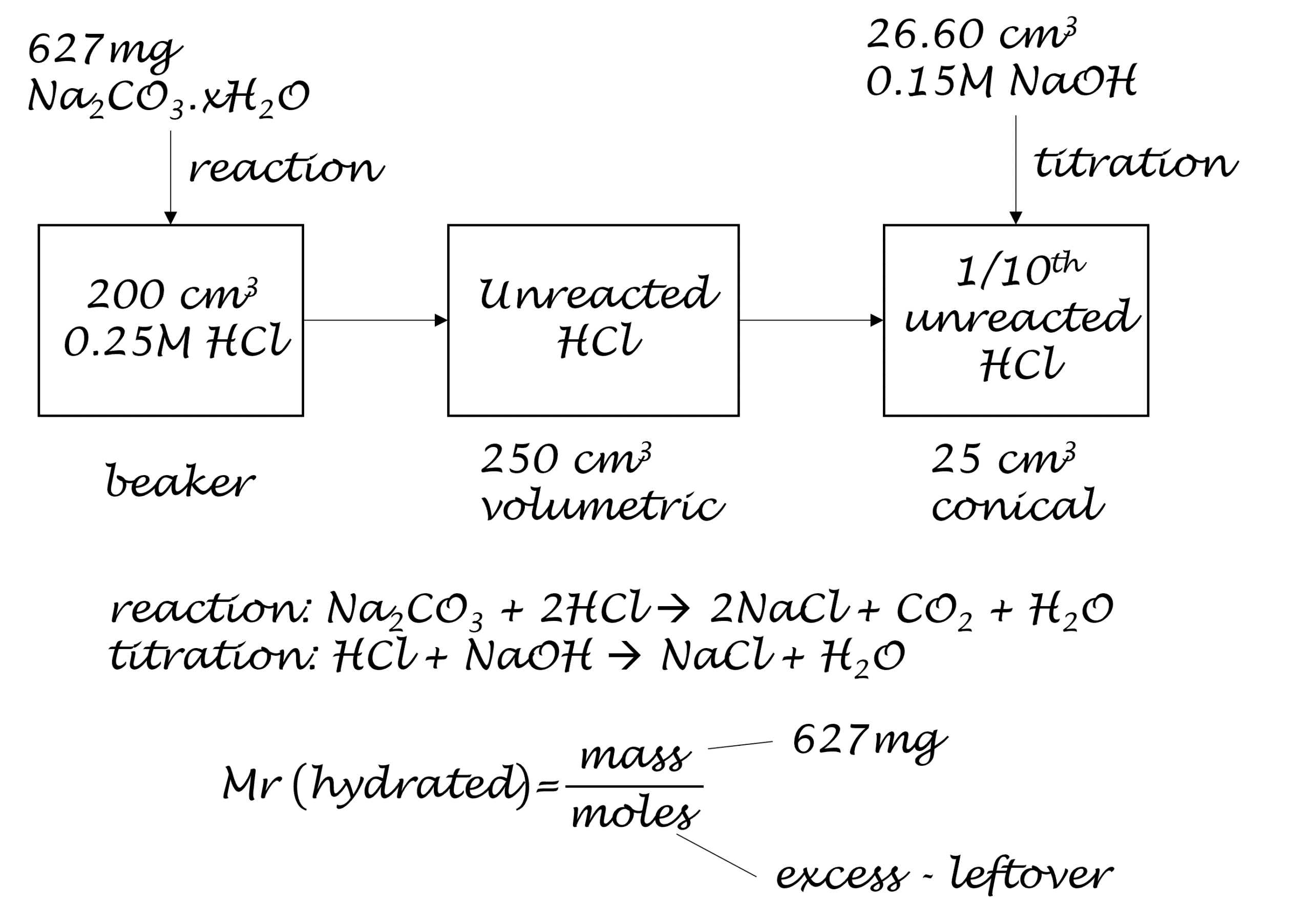
Practise Important Skills to Achieve Fluency
“Practice isn’t the thing you do once you’re good. It’s the thing you do that makes you good.”
The author of that quote, Malcom Gladwell, is also the person behind the “10,000-hour rule” – the idea that it takes 10,000 hours of practise to master a skill.
A Level chemistry has a lot of topics that are heavily skills focused, as opposed to being about concepts. These skills often involve a sequence of steps – an algorithm in other words – that you follow to get to the answer, and while the chemistry and numbers might change in different questions, the steps don’t. Skills are about “doing”, whereas concepts are about “understanding”.
For example, redox has some concepts and definitions you need to learn and apply, but it also has a lot of skills, such as working out oxidation states, writing half-equations, and writing balanced redox equations. Now, I am not suggesting you spend 10,000 hours practising redox balancing, but it is true to say that chemistry skills need to be practised so they are mastered, and you achieve fluency.
To find the skills you need to practise, go through your syllabus and think about what typical questions ask you to do for each topic. You’ll see that some topics are typically examined using ‘wordy’ questions, while others require calculations, diagrams, chemical structures and equations.
Important Skills to Practise For A-Level Chemistry
Here are the important skills you want to spend time mastering:
- All chemistry calculations involving the mole (yes, I know there are lots!)
- Balancing chemical equations (including redox equations)
- Writing ionic equations
- Writing half-equations
- Writing electron configurations
- Working out formulae of compounds
- Drawing dot-and-cross diagrams
- Drawing 3D shapes for molecules and ions
- Drawing energy cycles (Hess’s Law, Born-Haber)
- Determining rates from concentration vs. time graphs
- Deducing orders and rate equations from initial rate data
- Determine activation energy from Arrhenius plots
- Using ICE tables to calculate Kc and Kp
- Deducing oxidation states
- Identifying oxidation state changes
- Calculating Ecell values
- Drawing cell diagrams
- Performing redox titration calculations
- Drawing 3D transition metal complex ions
- Naming organic compounds
- Writing organic mechanisms
- Finding isomers
- Translating between different representations in organic chemistry (e.g. name to structural formula to skeletal formula etc.)
Don’t Overlook the Importance of Practical Chemistry
“Candidates who did well on this paper…displayed knowledge and understanding of important practical techniques and interpretation of raw practical results” (OCR A Examiner report, June 2019)
My A-Level chemistry students are often most worried about practical questions. There are several reasons for this:
- They test the “theory” of practical chemistry in greater depth than students are often prepared for. They may ask for explanations of steps in procedures, justification of apparatus choice, or for experiments to be designed with appropriate quantities and explanations of how data will be used in calculations.
- They focus on experimental errors and their outcomes. These are often overlooked when carrying out the required practicals in class because the objective is to do them correctly. Questions asking you to “suggest” an explanation for an unexpected experimental outcome can be exceedingly difficult if you’ve never experienced it.
- You may encounter familiar apparatus and techniques being used in unfamiliar experiments.
- The combination of apparatus, techniques, and chemical reactions you need to know creates many practical scenarios, but there are a smaller number of practise questions available in past papers.
How To Prepare for Practical Questions
First, understand that practical questions primarily test knowledge of apparatus and techniques. Each exam board has a list of required practicals that exemplify these apparatus and techniques. Each of these has a list of common errors that can arise due to apparatus misuse, or procedural mistakes. This is most often the basis for those difficult ‘Suggest…’ questions. To answer them, you need to understand experimental errors and their impact.
I recommend making detailed notes on the following:
| Focus of notes | What to include |
| Knowing the apparatus | Labelled diagrams of each piece of apparatus
A description of what it does, including an explanation of how its design is related to its function The justification for its use, e.g., why a pipette vs. a measuring cylinder, why a conical flask vs. beaker? The potential impact of each piece of apparatus on random and systematic errors |
| Understanding the techniques
|
A concise, step-by-step method for each required practical, including reagents and typical quantities where appropriate
A description of what each step is for (this will also highlight why certain apparatus choices are made) |
| Common errors | For each required practical, describe common errors related to apparatus handling and procedures.
For each of these errors, describe their impact on the experiment, including on calculated values. This can be the most difficult part. |
Some resources to help you are listed below.
Useful Practical Chemistry Resources
There are several board-specific books covering practical chemistry:
- Henry, N. and Scott, D. (2017). AS/A-Level 1 and 2 Student Guide. AQA Chemistry, practical assessment. Banbury, Oxfordshire, England: Hodder Education.
- Ryan, L. and Norris, R. (2014). Cambridge International AS and A Level Chemistry Coursebook. 2nd ed. Cambridge: Cambridge University Press.
- Scott, D. (2017). Edexcel A-Level Chemistry Student Guide : practical chemistry. Hodder Education.
- Henry, N. and Scott, D. (2017b). AS/A-LEVEL Years 1 and 2 Student Guide. OCR chemistry A and B, practical assessment. Banbury, Oxfordshire, England: Hodder Education.
Equally good are the practical chemistry notes that Neil Goalby has written on the excellent Chemrevise website:
All these resources include practise questions, including ones about common experimental errors. In addition to these resources, you can find practical questions in the following exam papers:
- AQA: Practical skills are assessed on all papers at AS and A-Level, but their A-Level Paper 3 is where you’ll find most practical questions.
- CAIE: Paper 3 (Advanced Practical Skills) and Paper 5 (Planning, Analysis and Evaluation) are entirely dedicated to assessment of practical chemistry.
- Edexcel A-Level: Both AS Papers contain practical questions, and A-Level Paper 3 (General and Practical Principles in Chemistry) has a heavy practical focus.
- Edexcel International A-Level: Paper 3 (Practical Skills in Chemistry I) tests AS practical skills, while paper 6 (Practical Skills in Chemistry II) tests AS practical skills.
- OCR A: Both AS papers have practical questions, as do all three A2 papers, but Paper 3 (Unified Chemistry) is often where you find the most demanding practical questions.
- OCR B: Like OCR A, both OCR B AS papers test practical skills, as do all three A2 papers, but paper 3 (Practical skills in chemistry) has the biggest practical focus.
Know How to Answer 6-Mark Questions Effectively
Mastering those dreaded 6-markers is high priority if you’re wanting a top grade. They often discriminate between candidates, with only top students scoring the maximum 6 marks for the more difficult questions.
Here is some advice on how to tackle them:
- Understand the Question: Before diving into your answer, take a moment to understand what the question is asking. Identify the key stages or parts that you need to address.
- Structure Your Answer: A well-structured answer is crucial. Begin with an introduction, followed by the main content, and conclude with a summary. This will ensure your answer is coherent and shows progression.
- Be Comprehensive: Aim to cover all the stages or parts of the question. Even if you’re unsure about one stage, attempt it. It’s better to provide some information than to leave it blank.
- Quality Over Quantity: While it’s essential to be comprehensive, avoid the temptation to write excessively. Focus on providing clear, concise, and relevant information.
- Review and Refine: Once you’ve written your answer, take a few minutes to review it. Ensure that you’ve met the criteria for the highest level and that your answer flows logically.
Extend Your Knowledge
“The best students showed a depth of understanding beyond the demands of A-Level.” (AQA Examiner Report, June 2018)
You’ll find many such statements in examiner reports, but I think this one hits the nail on the head. It suggests that the top-performing students demonstrated a level of understanding that exceeded the expectations and requirements for A-Level chemistry. In other words, these students showed a profound grasp of the subject, going beyond what is typically covered in the standard A-Level curriculum.
“Beyond the demands of A-Level” needs explaining because it’s an important part of preparing for an A*. It’s about:
- Wider Knowledge: Top students may have explored advanced or more complex concepts within the subject that are typically not part of the A-Level syllabus. They might have researched topics or areas related to chemistry that aren’t covered in the A-Level syllabus.
- Application and Critical Thinking: The best students may have demonstrated a higher level of critical thinking and analytical skills, providing insights and perspectives that are not commonly seen at A-Level. They could have applied their knowledge to real-world situations or novel problems, displaying a practical understanding beyond what’s expected.
Here are some things you can do to further and deepen your understanding of A-Level chemistry:
| Activity | What to do | Helps with |
| Extended Reading | Read books and materials beyond the standard course textbooks. This can provide alternative perspectives and more detailed information. | Wider Knowledge |
| Independent Research | Conduct independent research on topics related to the subject. Explore academic journals, books, and reputable online resources to gain in-depth knowledge. | Wider Knowledge |
| Seek Guidance | Approach teachers/tutors for additional guidance or resources. They can suggest advanced reading materials and offer insights to deepen your understanding. | Wider Knowledge |
| Competitions | Considering entering national chemistry competitions, such as the RSC Olympiad or the Cambridge Chemistry Challenge for lower sixth form students. | Wider Knowledge
Application and Critical Thinking |
| Problem-Solving | Do questions from other exam boards (including the IB Diploma). This will expose you to novel and more varied ways that familiar concepts can be tested. Widening your knowledge beyond your specification can also give you a better understanding of it. | Wider Knowledge
Application and Critical Thinking |
It’s important to understand that the quote above isn’t saying that only students that went beyond the demands of A-Level got an A*. I’m certainly not saying that you need to do all the things stated above to get an A*. Plenty of students achieve an A* by thoroughly mastering their own syllabus without doing any wider reading, or past papers from other boards.
My A-Level chemistry teacher used to say, “you can never know too much!”, which is a good way to look at it. You don’t have to go beyond the syllabus, but if you do, you’re likely to be better prepared for the exam. It’s about tipping the odds in your favour.
Focus your efforts on your exam specification, as it’s the key to your preparation. Just don’t view the specification as a strict boundary that can’t be crossed; some challenging questions might stretch beyond it by mixing concepts. Keep an open mind and remember that you can never know too much, even if it’s beyond your specification.
Useful Resources
I’ve listed here some useful resources for widening your knowledge:
Books
- Clark, J. (2000). Calculations in AS/A level chemistry. Harlow, Essex England: Longman. A classic text that will help boost your maths skills for A-Level chemistry.
- Keeler, J. and Wothers, P. (2009). Why chemical reactions happen. Oxford: Oxford University Press. An extremely popular book on university reading lists for new students, this book will answer many of the “but why?” questions you had studying A-Level chemistry.
- Burrows, A. (2021). Chemistry3 : Introducing inorganic, organic, and physical chemistry. Oxford: Oxford University Press. Also aimed at first-year university students, this excellent textbook provides higher-level explanations behind many A-Level concepts.
Journals
- The Mole (Royal Society of Chemistry)
- Chemistry World (Royal Society of Chemistry)
- ChemMatters (American Chemical Society)
- Hodder Chemistry Review
- New Scientist
- Scientific American
Websites/Apps
Final Words
Phew! This was a long guide and I hope you found something useful in it.
There are a couple of other important things to mention. Theodore Roosevelt (the 26th US President) famously said, “Nothing worth having comes easy”. Getting an A* in chemistry is a valuable prize that is only earned after through a huge amount of hard work and dedication. I’ve given you a strategy to help you organise and managed your studies more effectively and efficiently, but only you can provide the required effort.
Lastly, remember that success is an ongoing journey. A* understanding doesn’t come overnight, and there will be times when it feels like one step forward, two steps back. Seek support when needed and take regular breaks. Make sure you follow my advice to take a day off from studying each week to do something enjoyable.
Best of luck with your studies!


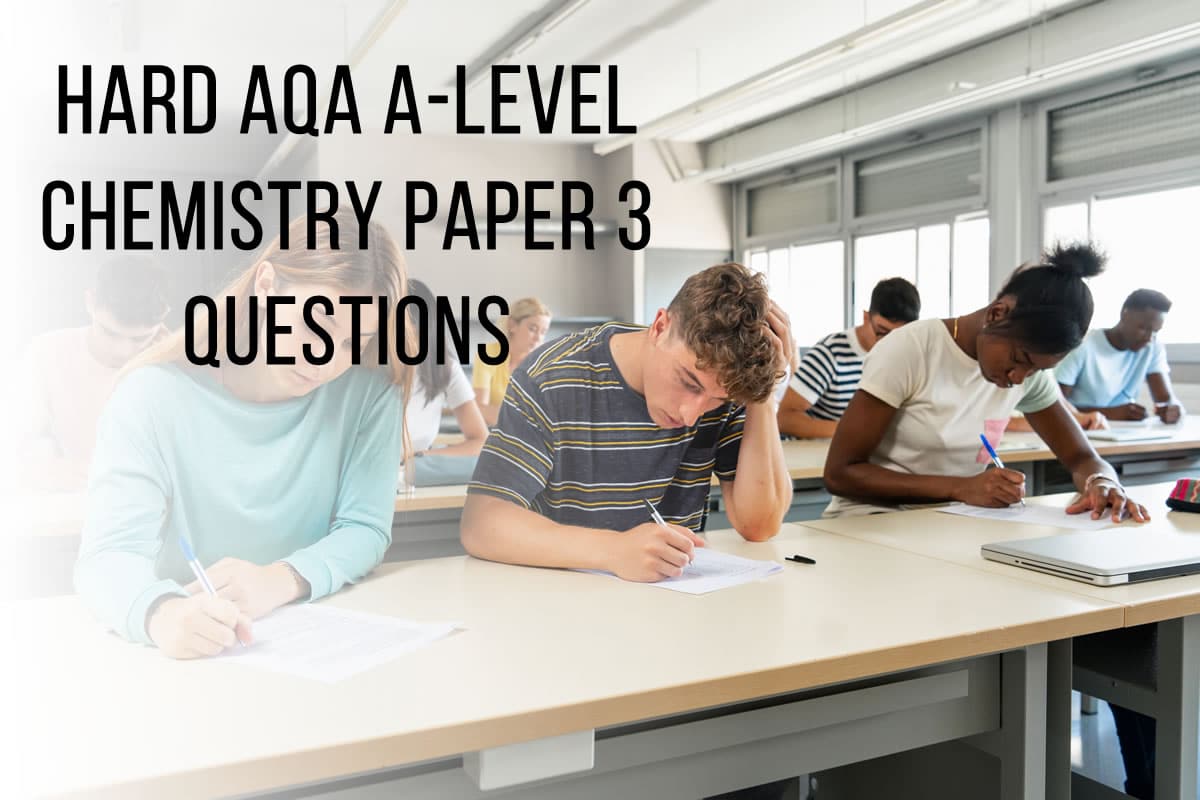
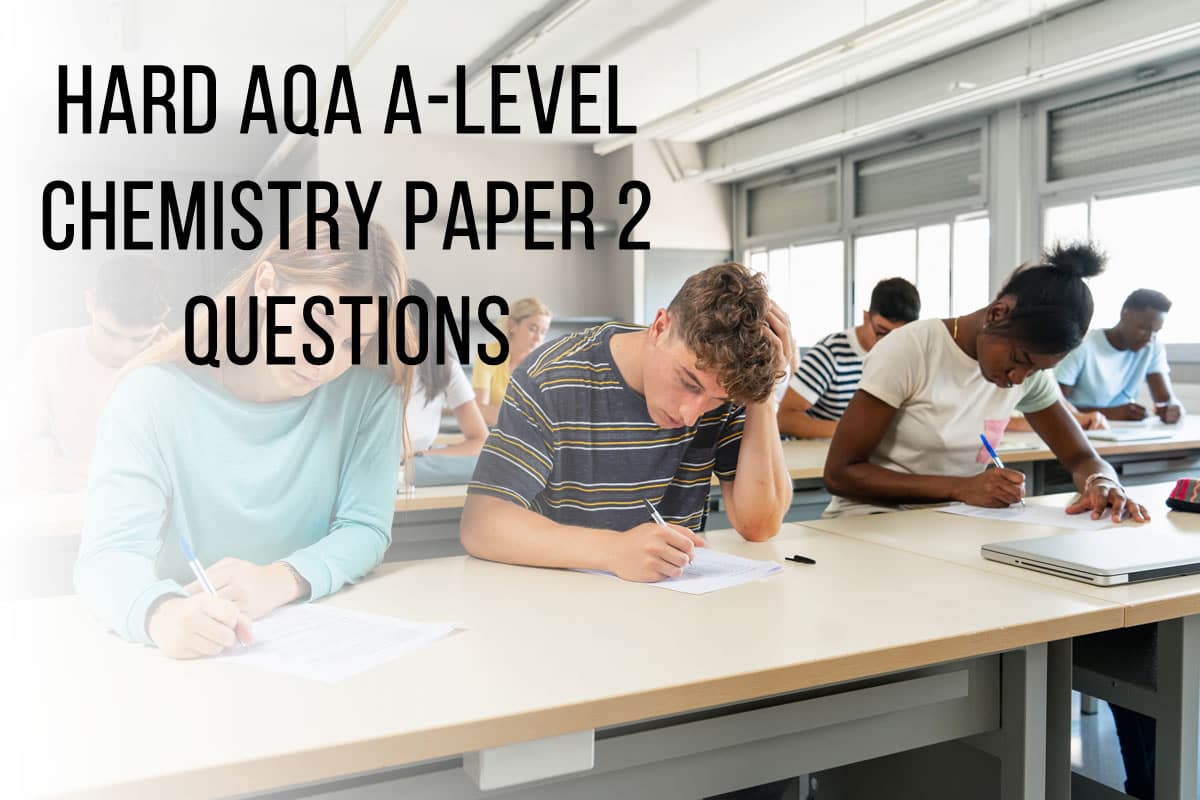
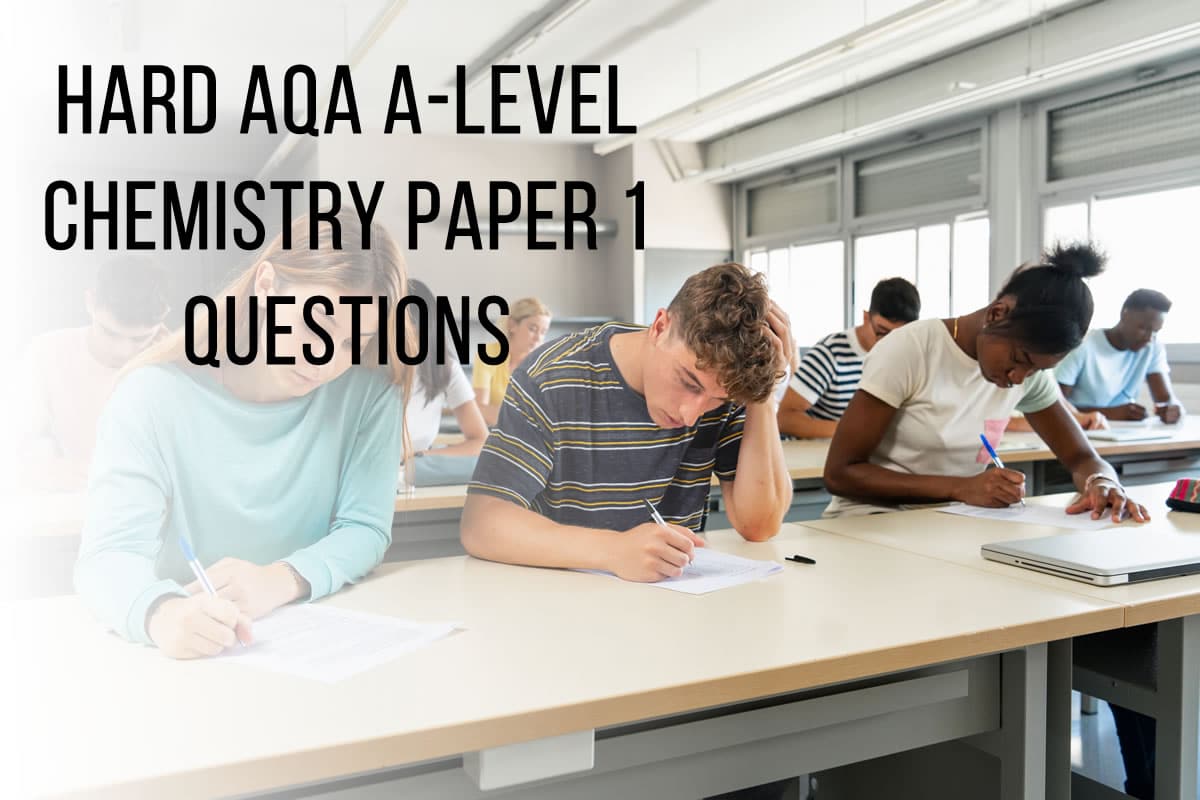


Thanks for this amazing article.
For calculations I recommend this book with very detailed explanations called “how to get an A in chemistry” http://konyvbagoly.hu/tankonyv/121405-how-to-get-an-a-in-chemistry-9789631647266.html?search_query=Chemistry+&results=5
Really a very helpful article thanks for sharing and keep on sharing!
Hi Dr Carl,
Thanks for the really nice article, wondering if you can also recommend taking questions for the Olympiads? These can be very tough indeed, good to push the abilities of the bright students.
Thanks, Wouter.
Yes, this is a good point – the RSC Olympiad and Cambridge Chemistry Challenge can be useful sources of questions that test understanding and problem-solving skills in unfamiliar situations. I will edit the post to mention these, thanks Wouter!
Thank you for sharing this 🙂
“I am really inspired along with your writing abilities as well as with the format to your weblog.
Is this a paid theme or did you customize it your self? Anyway stay up the nice
quality writing, it is rare to peer a nice weblog
like this one today..”
I keep listening to the news update speak about getting free online grant applications so I have been looking around for the best site to get one. Could you advise me please, where could i acquire some?
Erm, no.